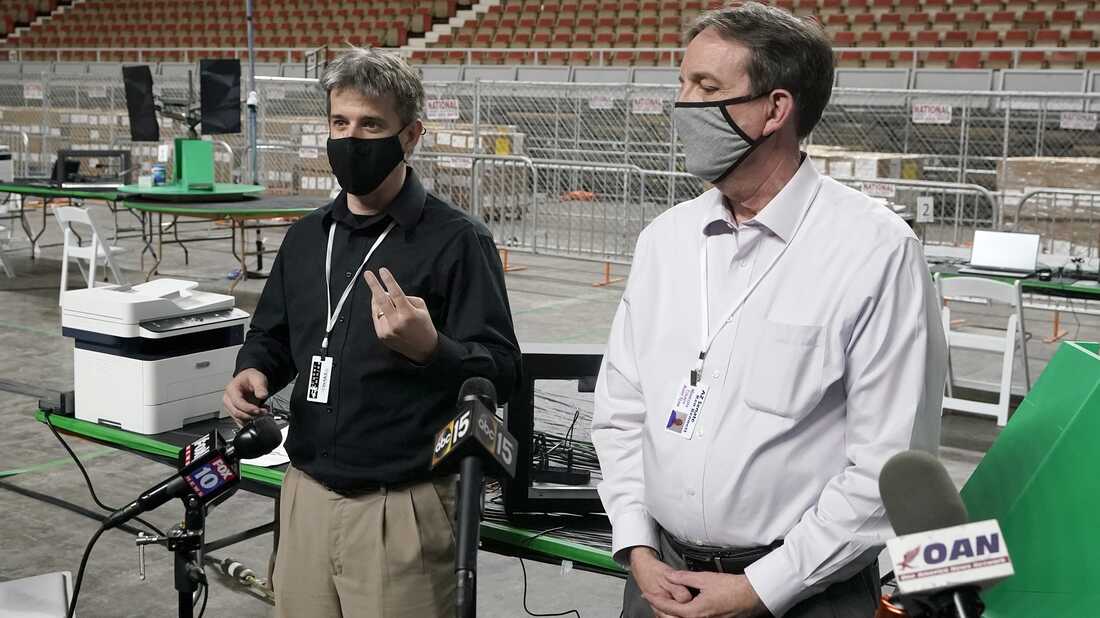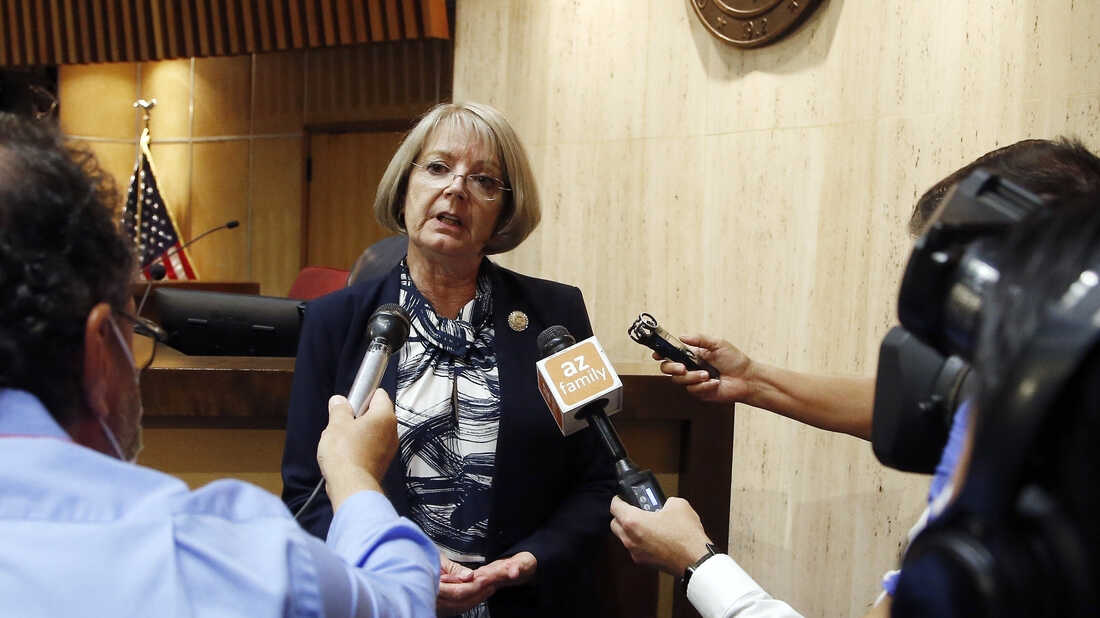Arizona ‘Audit’: Here’s What Might Happen Next

Republican state senators’ election review in Arizona’s Maricopa County appears to be wrapping up. Matt York/AP hide caption
toggle caption
Matt York/AP

Republican state senators’ election review in Arizona’s Maricopa County appears to be wrapping up.
Matt York/AP
A widely criticized Republican-led review of the 2020 general election in Arizona’s largest county appears to be nearing the finish line.
The examination in Maricopa County, which was ordered by GOP state senators, began in late April and has lasted weeks longer than anticipated.
At the end of July, the Senate’s contractors vacated the Arizona State Fairgrounds in Phoenix, where they had struggled to accurately count exactly how many ballots they had in their possession — nearly 2.1 million, according to county election officials.
Now the company leading the review — Cyber Ninjas, a Florida-based cybersecurity company with no prior experience in elections, and that’s led by a CEO who’s embraced conspiracies of election fraud — is preparing a final report on its findings.
Here’s a look at what happens next:
Is the GOP-led probe really almost over?
It appears so, though Republican state Senate President Karen Fann is considering options that could further expand the scope of the review.
Cyber Ninjas CEO Doug Logan recently recommended sending workers door-to-door in parts of Maricopa County to canvass voters. He had claimed it was the only way to explain why there were roughly 74,000 more early votes cast in the election than there were early ballots mailed to voters — though election officials were quickly able to debunk that by explaining that county voters can vote early by mail or early in person.
The U.S. Department of Justice has warned Fann that going door-to-door to ask voters about their ballots could violate federal laws against voter intimidation. But Fann hasn’t ruled it out. It’s unclear how long a canvass of voters could take — or how the DOJ would respond.

Cyber Ninjas CEO Doug Logan, left, and former Arizona Secretary of State Ken Bennett talk on April 22 about overseeing a 2020 election review at the Arizona Veterans Memorial Coliseum in Phoenix. Ross D. Franklin/AP hide caption
toggle caption
Ross D. Franklin/AP

Cyber Ninjas CEO Doug Logan, left, and former Arizona Secretary of State Ken Bennett talk on April 22 about overseeing a 2020 election review at the Arizona Veterans Memorial Coliseum in Phoenix.
Ross D. Franklin/AP
The state Senate president also sent another subpoena to Maricopa County in late July, demanding records she claims are necessary to complete the election examination. But county elected officials have chosen to defy most of her demands.
Maricopa County Supervisor Bill Gates, a Republican, said the drawn-out review process has devolved into nothing more than “political theater.”
“This is trying to get the attention off of them and the fact that their whole endeavor is crumbling, and to instead point to Maricopa County and say that we’re the problem,” Gates said. “We’re not the problem — it’s people focused on conspiracy theories, that’s the problem.”
Can Cyber Ninjas’ report be trusted?
A bipartisan cast of critics — from Arizona Democrats to Republican elected officials in Maricopa County to national election experts — says no.
On Aug. 2, the chair of the county Board of Supervisors, Jack Sellers, wrote that by backing the probe, senators were entertaining an “adventure in never-never land.”
“We don’t put stock in what they’re going to say one way or another,” Maricopa County Recorder Stephen Richer, a Republican, said in July.
Fann has repeatedly claimed the review is about “ensuring election integrity” in response to voters’ concerns, though her statements are just as frequently undercut by other Senate Republicans who claim, falsely, that their so-called audit has already proven the election was rigged and stolen from former President Donald Trump.
Trump himself has made those baseless claims, and records released by Cyber Ninjas confirm the operation is funded almost entirely by nonprofits who back the president’s claims. According to Cyber Ninjas, those entities include The America Project, which is led by former Overstock.com CEO Patrick Byrne and contributed $3.25 million, and Voices and Votes, an effort led by two OANN correspondents that’s raised $605,000.
Beyond questioning the motivations behind the review, election experts have roundly criticized Cyber Ninjas’ methodologies for recounts and analysis.
Cracks have emerged even among the auditing team and GOP state senators. At the end of last month, Fann’s appointed liaison to the review — Ken Bennett, a former Arizona secretary of state whose experience was supposed to lend the operation credibility — briefly quit in a spat with Cyber Ninjas over transparency.
And Fann can no longer claim that a majority of the Arizona Senate supports the review. Two Republican senators now publicly oppose it; one, a senator who was key in enacting new changes to the state’s voting systems, said recently the examination process was “botched.” Combined with the Senate’s 14 Democrats, a majority of the chamber now opposes the review. That leaves Fann incapable of holding votes to force Maricopa County officials, or anyone else, to comply with her demands.
accounting of the 2020 election. That’s inexcusable, but it shows what can happen when Republicans do not take election integrity deadly serious. (5of5)
— Michelle Ugenti-RITA (@MichelleUgenti) July 25, 2021
What might the final report say?
Cyber Ninjas’ contract says its report is supposed to detail its review of votes cast for the 2020 presidential and U.S. Senate races in Maricopa County, an analysis of county voter registration data and a review of the county’s voting systems. It’s also supposed to make recommendations for future election administration.
Beyond that, it’s unclear what else the report might claim.
Perhaps the biggest question remains what conclusion Cyber Ninjas will make about votes for president — will the firm’s report conclude, as some Republican state senators believe, that Trump won the popular vote in Arizona, not President Biden?
If the report makes such a claim, could it threaten Biden’s presidency?
Legal scholars say, emphatically, no.
Paul Bender, a constitutional law professor at Arizona State University, said there’s no process to “decertify” or “revoke” election results, as some Arizona state senators have demanded, after those results are finalized by Congress.
“It’s over. The election is over,” Bender said. “Once that’s happened, you can’t go back and redo the thing.”
And of course, even if some Arizona Republicans baselessly claim Trump won the state’s 11 Electoral College votes, Biden’s wins in other battleground states assured a healthy margin of victory.
Even Fann, the state Senate president who ordered the controversial review, says it’s not motivated by a desire to overturn the 2020 election results.
Then what’s it all for?
According to documents outlining the contract, the final report will also include recommendations to prevent “detected weaknesses from being a problem in future elections.” Fann has said information provided by the contractors will provide the Senate with “the tools to be able to either tweak existing legislation, or create new legislation to make sure that the sanctity is always there.”
Democrats and election experts warn that that means the review ultimately will be used to justify restrictive voting laws. Those restrictions could be disguised as legislative “fixes” to problems Cyber Ninjas may claim to have uncovered, they say.
Raquel Teran, a state representative and chair of the Arizona Democratic Party, watched from the minority as Republican passed several changes to the state’s election laws in the legislative session that ended in June. Other bills that fell short of passing in 2021 will likely be revived, she said, and Republicans may use the report from the review — however unreliable it may be — to justify passing those same bills in 2022.

Arizona state Senate President Karen Fann, a Republican, has said the election review will provide the Senate with “the tools to be able to either tweak existing legislation, or to create new legislation.” Ross D. Franklin/AP hide caption
toggle caption
Ross D. Franklin/AP

Arizona state Senate President Karen Fann, a Republican, has said the election review will provide the Senate with “the tools to be able to either tweak existing legislation, or to create new legislation.”
Ross D. Franklin/AP
Will there be more reviews of future elections?
Election experts and Democrats say it’s likely. Teran said the Arizona Republican state senators set a dangerous precedent of second-guessing any election in which they aren’t satisfied with the results.
The Senate established its authority to demand voting records from Maricopa County, or any other jurisdiction in Arizona responsible for running elections. To date, the Maricopa County Board of Supervisors has opted against challenging that authority via an appeal. Given that legal precedent, as long as Republicans hold the majority in the Senate, it’s entirely possible this process could repeat itself in 2022 and beyond.
And it’s not just Arizona. Similar reviews are now being sought or debated by Republican state lawmakers across the country.



